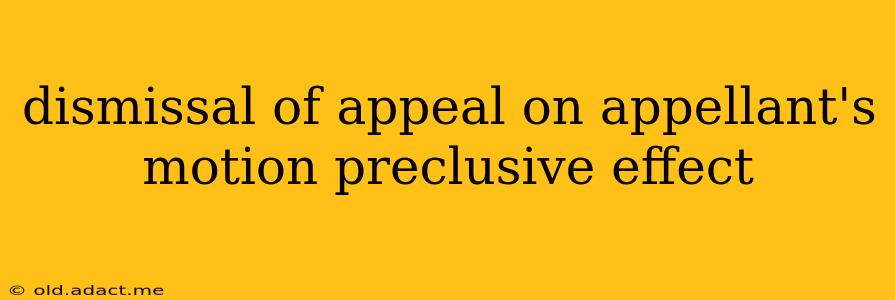The dismissal of an appeal on the appellant's motion presents a complex legal issue regarding its preclusive effect on future litigation. While seemingly straightforward—the appellant initiated the dismissal, so it shouldn't have preclusive consequences—the reality is nuanced and depends heavily on the jurisdiction and the specific circumstances surrounding the dismissal. This post will explore the various aspects of this situation, answering common questions and providing clarity on this often-misunderstood area of law.
What Happens When an Appellant Voluntarily Dismisses an Appeal?
When an appellant voluntarily dismisses their appeal, they are essentially abandoning their challenge to the lower court's decision. This action, in most jurisdictions, prevents them from relitigating the same issues in a subsequent lawsuit. The key here is voluntariness. A dismissal compelled by the court due to procedural defaults or other compelling reasons carries a different legal weight.
Does Dismissal of an Appeal on Appellant's Motion Preclude Future Litigation?
The preclusive effect of a voluntary dismissal of an appeal is generally considered to be res judicata (or claim preclusion) and/or collateral estoppel (or issue preclusion), depending on the specific facts. Res judicata bars relitigation of the entire claim, while collateral estoppel bars relitigation of specific issues already decided.
The effect hinges on the reason for the dismissal. If the appellant dismissed to avoid an adverse ruling on the merits, the dismissal is likely to have a strong preclusive effect. However, if the dismissal was based on a procedural matter, such as a missed deadline, or for reasons unrelated to the merits, the preclusive effect might be significantly weakened or nonexistent.
Can an Appellant Refile the Same Case After Dismissing the Appeal?
Generally, no. Once an appeal is voluntarily dismissed, refiling the same case usually faces significant hurdles. The court might raise res judicata as a defense, arguing that the appellant had their opportunity to challenge the lower court's decision and chose to abandon it. Attempting to refile could be viewed as an abuse of the judicial process.
What are the Exceptions to the Preclusive Effect of a Voluntary Dismissal of an Appeal?
Several exceptions exist, and their applicability depends on the specifics of the case and the jurisdiction's rules. These may include:
- Lack of Jurisdiction: If the appellate court lacked jurisdiction over the appeal, the dismissal does not prevent a future action in a court with proper jurisdiction.
- Fraud or Misrepresentation: If the dismissal was obtained through fraud or misrepresentation, the preclusive effect may be nullified.
- Manifest Injustice: In some jurisdictions, courts may allow refiling if the dismissal resulted in manifest injustice.
- Withdrawal of Dismissal: In some cases, the appellant may be able to withdraw their motion to dismiss the appeal within a certain timeframe, depending on the court's rules.
What Constitutes a "Voluntary" Dismissal?
The crucial aspect is whether the dismissal was truly voluntary. Coerced dismissals, for example, due to pressure from opposing counsel or impracticalities, might not have the same preclusive effect as a freely chosen dismissal. Courts meticulously examine the circumstances surrounding the dismissal to determine the degree of voluntariness.
What if the Dismissal was Without Prejudice?
A dismissal "without prejudice" explicitly states that the appellant retains the right to refile the case. This is unusual in appeal situations but is possible. However, a dismissal "with prejudice" generally has a strong preclusive effect.
It’s imperative to consult with legal counsel to understand the specific implications of a dismissal of an appeal within the relevant jurisdiction and based on the unique circumstances of the case. The information presented here is for educational purposes only and should not be considered legal advice. Each situation is unique and requires individual legal analysis.
